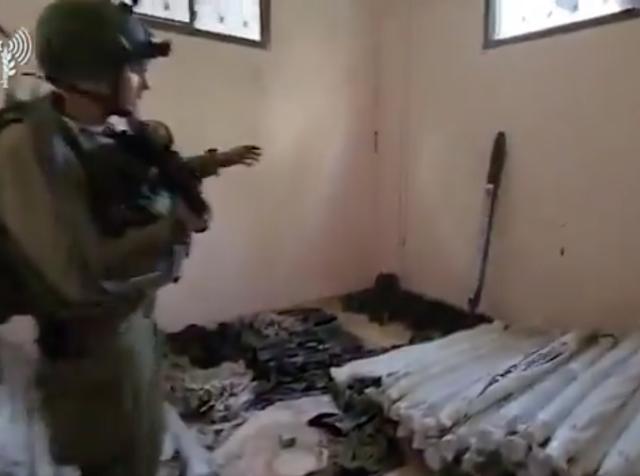On Wednesday, Israeli forces intensified their engagement with Hamas militants throughout Gaza, notably escalating their ground offensive in its second-largest city. This expansion has critically limited safe havens for Palestinians and disrupted essential aid distribution across much of the territory.
The southern offensive heightens the risk of widespread displacement in the besieged coastal enclave, already witnessing over 80% of its 1.87 million population displaced, according to the U.N. Unlike other conflicts, there has been no U.N. initiative to relocate Palestinians, and Egypt has kept its borders closed to Palestinians wanting passage to countries that have offered to take them in.
Not only is Egypt not opening its border to Palestinian refugees, Arab media reports that Egypt is building a concrete wall to stop them from crossing the border.
— Aviva Klompas (@AvivaKlompas) December 6, 2023
Northern regions, including vast areas of Gaza City, have seen extensive destruction, largely due to Hamas situating missile launchers and weapon factories in residential areas. The rest of Gaza now faces a similar threat as Israel continues its efforts to dismantle Hamas, which has entwined its terror network throughout the region over 16 years of rule.
Following the Oct. 7 attack that sparked the current conflict, Israel has declared the cessation of Hamas's military presence in Gaza non-negotiable. Prime Minister Benjamin Netanyahu has asserted Israel's necessity for ongoing security control over the area, despite international opposition, including from the United States.
Our forces continue to operate against Hamas’ leadership in Gaza:
— Israel Defense Forces (@IDF) December 6, 2023
🔴IDF forces eliminated several Hamas commanders and operatives of the Northern Gaza Strip Brigade—the second largest brigade of Hamas—who were hiding in a tunnel located near the Indonesian Hospital during the… pic.twitter.com/mydADVsJaX
The Israeli military reported significant advances into the southern city of Khan Younis, marking what it called 'the most intense day' of combat since the ground operation's inception five weeks prior.
Aid distribution, now limited to basic supplies, is confined to the border city of Rafah due to ongoing clashes and Israeli roadblocks, as per the U.N.’s humanitarian office. Doctors Without Borders highlighted critical shortages of fuel and medical supplies at Al-Aqsa Martyrs Hospital in Deir al-Balah, with daily admittances of up to 200 wounded since the lapse of a week-long truce on Dec. 1. Israel has responded by establishing mobile hospitals to mitigate the crisis and facilitate the removal of terror infrastructure entrenched in these facilities.
During a mission by #IDF troops of Battalion 7007 of the 261st Brigade's combat team found dozens of rockets hidden under #UNRWA crates in the northern #Gaza Strip including 30 Grad missiles & dozens of other missiles. #Hamas_is_ISIS #DefundTheUN #defundUNRWA #warcrimes #Israel pic.twitter.com/s0Imt5FL3H
— Ora Levitt 🇮🇱 חיילת צה"ל 🇮🇱 עם ישראל חי (@IDFsoldiergirl) December 3, 2023
Despite claims of a power outage since early October, observable indicators such as phone charging, social media activity, TV usage, and visible lighting suggest otherwise. Hospitals, operating on generators needing fuel, face challenges due to diversion by Hamas loyalists and citizens.
Hamas reports 16,200 fatalities, predominantly women and children, in the conflict. However, distinctions between civilians and combatants remain unclarified, with those under 25 often categorized as children.
I see all of the people who support the use of child soldiers and child suicide bombers by Palestinian terrorists are complaining about the IDF treatment of Palestinian children again. pic.twitter.com/SeebhXThtV
— Renderpedia (@Render64) November 29, 2023
The Israeli military accuses Hamas of using civilians as human shields in residential areas, complicating evacuation efforts despite prior warnings. IDF Chief of Staff Herzi Halevi noted the challenge of targeting militants who operate from civilian structures.
Israel emphasizes the imperative of removing Hamas from power to prevent attacks like the one on Oct. 7, when Hamas and allied militants killed around 1,200, mostly civilians, breaching Israel’s defenses and capturing around 240 people.
Following a recent cease-fire, over 100 hostages were released, along with 240 Palestinian prisoners by Israel. Testimonies from released hostages reveal instances of maltreatment and assault by Hamas militants, corroborating allegations of widespread human rights violations during the Oct. 7 attack.


